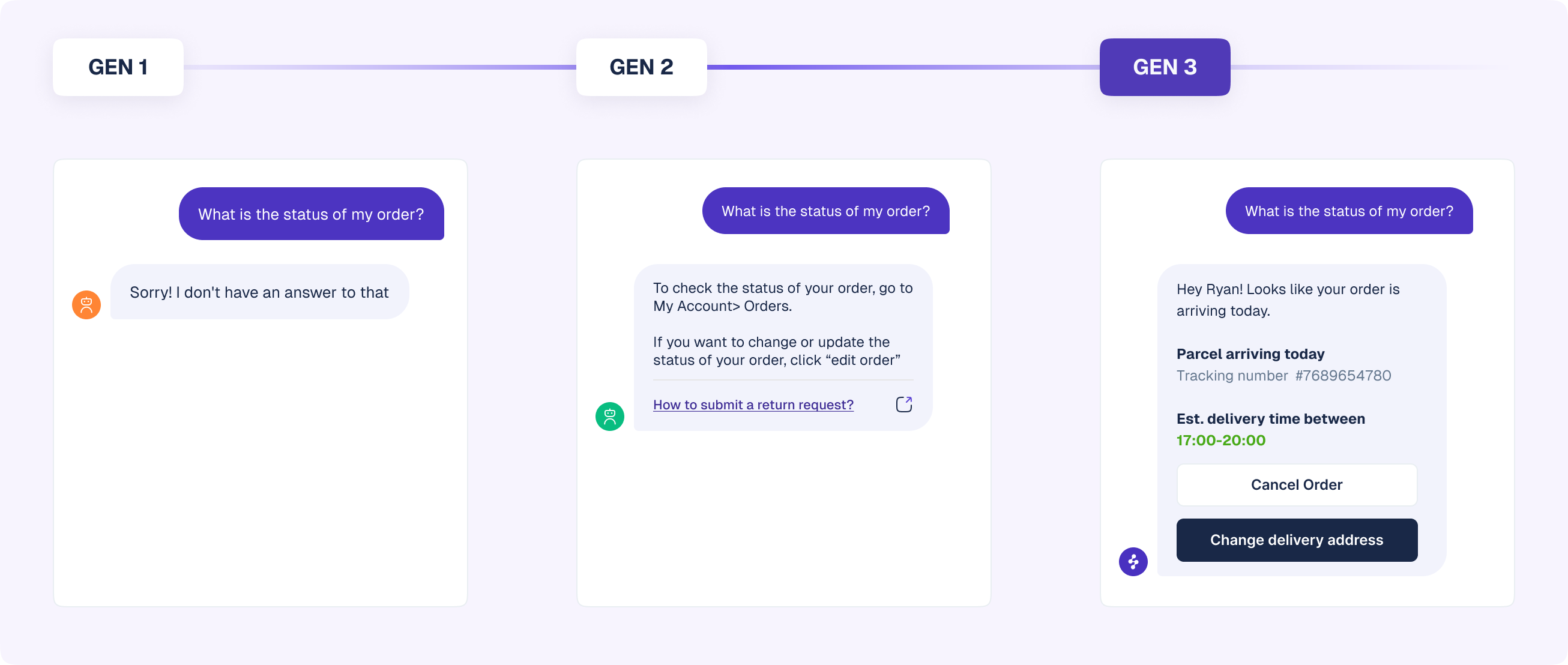AI Support Agent Trends in 2025: What’s Next for Support Automation
Introduction: The Shifting Landscape of AI Support
The field of AI support has undergone a seismic transformation in recent years, largely driven by breakthroughs in artificial intelligence. Once limited to simple scripted bots, AI Support Agents now leverage sophisticated language models, real-time analytics, and seamless integrations with core business systems. These innovations aren’t just making support faster, they’re reshaping organizational workflows, boosting user satisfaction, and reducing overhead at scale.
What will support look like in 2025? Expect even more seamless automation, heightened predictive insights, and AI orchestrators that unify specialized bots under one cohesive strategy. We are in the future already by blending knowledge ingestion, ticketing integrations, and deep conversation capabilities.

Here’s a quick look at the 5 biggest trends driving this change:
- Agents can handle highly complex tasks on their own:
Advanced AI will independently manage complex workflows, reducing the need for human intervention in routine support queries. - AI orchestrators for AI Agents:
Centralized platforms coordinate multiple specialized agents, ensuring smooth collaboration and streamlined resolution pathways. - Augmenting the human workforce:
AI-driven support offloads repetitive tasks, empowering human agents to focus on nuanced, empathy-driven interactions. - Long-term Impacts on Support:
Organizations see improved scalability, cost savings, and enhanced customer satisfaction, transforming support into a strategic, data-driven asset. - Recap trends and their significance moving forward:
These developments position AI support as the driving force behind proactive, efficient service delivery, reshaping the competitive landscape.
Agents Can Handle Highly Complex Tasks on Their Own
Enterprises are increasingly using AI to automate complex support workflows. From multi-step troubleshooting to regulatory compliance checks. Over 65% of large organizations expect AI-driven systems to handle advanced tasks without human input within two years. This shift is fueled by improvements in natural language processing (NLP) and decision-making algorithms, which enable AI agents to understand the context and execute tasks that once required manual oversight.
By automating intricate processes, businesses reduce the risk of human error and improve service consistency. In many cases, AI-driven support can cut escalation rates by up to 40%, freeing human specialists to tackle strategic or high-value activities. As these capabilities evolve, AI agents will increasingly manage not just simple FAQs, but complex scenarios like in-depth technical configurations, sophisticated upselling routes, and dynamic compliance validations.
AI Orchestrators for AI Agents
As AI ecosystems expand, orchestrators act as command centers that direct specialized agents to the right tasks. Gartner predicts that by 2025, more than 50% of large enterprises will deploy some form of AI orchestration platform to streamline support queries. These orchestrators can intelligently route customer questions about billing, product usage, or technical issues to the AI agent best suited for each scenario.
The result is a unified network of specialized agents functioning harmoniously under a single governance model. This not only reduces operational silos but also allows for real-time data sharing, so each AI agent learns from the collective experience. In turn, support teams benefit from faster resolution times, consistent brand messaging, and scalable performance across various channels and departments.
Augmenting the Human Workforce
Despite growing sophistication, AI is not replacing human expertise; rather, it’s complementing it. A survey by Deloitte found that 72% of companies using AI support agents reported higher employee satisfaction because team members could focus on creative and complex work. Delegating repetitive tasks like password resets or form submissions to AI agents leaves human staff free for strategic decision-making and empathetic user interactions that enhance brand loyalty.
This blend of AI efficiency and human empathy can also lead to better cost management. Studies suggest that augmenting human teams with AI can slash service operation costs by 25% or more, as automated workflows reduce the need for additional hires during peak periods. When scaled effectively, this synergy provides a competitive edge, ensuring companies remain productive and innovative even as demands grow.
Long-Term Impacts on Support
The ripple effects of advanced AI agents for support go well beyond near-term cost savings. According to Forbes, companies that deeply integrate AI into customer-facing operations can expect up to a 35% increase in net promoter scores (NPS). By handling high volumes of queries around the clock and at consistently high quality, AI agents bolster customer trust and loyalty.
On the internal side, continuous learning algorithms deliver insights that refine organizational processes. This data-driven feedback loop can lead to more informed product development, faster response to market shifts, and improved training for both AI agents and human staff. Over time, these AI-enabled capabilities can transform support from a cost center into a strategic differentiator, positioning enterprises to adapt quickly to changing market conditions.
The Evolution of AI Support: From Basic Bots to Brilliant Agents

AI support tools have come a long way, evolving through distinct generations that set the stage for what’s coming in 2025. Here’s the rundown:
- Gen 1: Rule-Based ChatbotsThe earliest AI support tools were like robots reading from a playbook. They could tackle basic questions—think “What’s your return policy?” but anything off-script left them stumped. Keeping them useful meant constant manual updates, a real time-sink for support teams.
- Gen 2: Machine Learning ChatbotsNext up, machine learning gave chatbots a brain boost. By crunching data from past interactions, they could answer more questions with better accuracy. The catch? They needed tons of human-prepared data and regular tweaking to keep them sharp.
- Gen 3: Generative AI AgentsNow, generative AI agents are stealing the show. These powerhouses tap into advanced language models to handle complex queries, pulling answers from docs, tickets, or even thin air. Better yet, they’re proactive. Creating tickets or updating systems without a human nudge.
Industry-Specific AI Solutions (e.g., Enjo)
Not all AI support agents are created equal. IT has its own set of complexities, compliance standards, and operational frameworks that off-the-shelf bots simply can’t address. Because nearly 70% of large organizations plan to adopt specialized AI solutions for IT service management by 2025, underscoring the growing demand for sector-specific capabilities.
- Custom Engagement Styles
Enjo adapts to each IT environment’s workflows and brand guidelines, whether handling routine helpdesk tickets or escalations. This tailored approach ensures interactions reflect the appropriate tone, protocols, and SLAs. - Specialized Support Agent Protocols
Enterprise IT tasks—even user access resets often involve strict security steps, multiple system checks, and audit histories. Enjo’s AI agents enforce these procedures automatically, logging every action and adhering to industry-specific best practices for a swift, compliant support experience.
We have come a long way from Gen1 to Gen3, and it doesn’t stop here. The parallels or different threads to AI Support Agents are far beyond this and we are looking at a future where it could be even more exciting and rewarding. We are looking at:
- Human-Like, Hyper-Personalized Interactions: AI-powered help desks will mimic human agents, tailoring responses to individual preferences using real-time customer data for a bespoke support experience.
- Seamless Omnichannel Support: Customers will enjoy consistent assistance across platforms chat, email, or social media. Ensuring a unified, frictionless journey.
- Proactive Issue Resolution: Leveraging real-time data and IoT integration, AI agents will predict and fix problems before users notice, enhancing efficiency.
- Emotionally Intelligent Agents: These AI systems will detect mood shifts and cultural cues, adjusting tone and approach for empathetic, relevant interactions.
- Multilingual Capabilities: Support will span languages effortlessly, breaking barriers and catering to global companies with localized nuance.
- Augmented Reality (AR) Troubleshooting: AR will guide users through complex fixes visually, pairing AI precision with interactive problem-solving.
- Self-Improving AI: Agents will learn continuously from interactions, refining responses and adapting to new challenges over time.
- Collaboration with Human Agents: For intricate cases, AI will partner with humans, blending automation with human insight for optimal outcomes.
- Ethical, Transparent Design: Built with fairness in mind, these systems will prioritize trust, though privacy and bias risks must be managed.
- Challenges to Address: Balancing automation with human touch, ensuring data security, and eliminating bias will remain key hurdles for adoption.

Recap: Trends and Their Significance Moving Forward
The trajectory of AI support trends ranging from orchestration platforms to AI agents capable of autonomous complex tasks—promises to reshape operations in the years ahead. As adoption grows, companies stand to gain from faster resolution times, lower overhead, and deeper customer engagement. Meanwhile, advanced analytics embedded within AI systems provide a clearer view of user behavior, fueling constant improvement and future innovation.
In short, these trends represent more than just short-term efficiency gains, they’re a blueprint for sustainable growth and resilience. By prioritizing AI integration, organisations equip themselves to navigate shifting economic conditions, heightened customer expectations, and the ongoing demand for better, faster service.

Here’s a quick look at the 5 biggest trends driving this change:
- Agents can handle highly complex tasks on their own:
Advanced AI will independently manage complex workflows, reducing the need for human intervention in routine support queries. - AI orchestrators for AI Agents:
Centralized platforms coordinate multiple specialized agents, ensuring smooth collaboration and streamlined resolution pathways. - Augmenting the human workforce:
AI-driven support offloads repetitive tasks, empowering human agents to focus on nuanced, empathy-driven interactions. - Long-term Impacts on Support:
Organizations see improved scalability, cost savings, and enhanced customer satisfaction, transforming support into a strategic, data-driven asset. - Recap trends and their significance moving forward:
These developments position AI support as the driving force behind proactive, efficient service delivery, reshaping the competitive landscape.
Agents Can Handle Highly Complex Tasks on Their Own
Enterprises are increasingly using AI to automate complex support workflows. From multi-step troubleshooting to regulatory compliance checks. Over 65% of large organizations expect AI-driven systems to handle advanced tasks without human input within two years. This shift is fueled by improvements in natural language processing (NLP) and decision-making algorithms, which enable AI agents to understand the context and execute tasks that once required manual oversight.
By automating intricate processes, businesses reduce the risk of human error and improve service consistency. In many cases, AI-driven support can cut escalation rates by up to 40%, freeing human specialists to tackle strategic or high-value activities. As these capabilities evolve, AI agents will increasingly manage not just simple FAQs, but complex scenarios like in-depth technical configurations, sophisticated upselling routes, and dynamic compliance validations.
AI Orchestrators for AI Agents
As AI ecosystems expand, orchestrators act as command centers that direct specialized agents to the right tasks. Gartner predicts that by 2025, more than 50% of large enterprises will deploy some form of AI orchestration platform to streamline support queries. These orchestrators can intelligently route customer questions about billing, product usage, or technical issues to the AI agent best suited for each scenario.
The result is a unified network of specialized agents functioning harmoniously under a single governance model. This not only reduces operational silos but also allows for real-time data sharing, so each AI agent learns from the collective experience. In turn, support teams benefit from faster resolution times, consistent brand messaging, and scalable performance across various channels and departments.
Augmenting the Human Workforce
Despite growing sophistication, AI is not replacing human expertise; rather, it’s complementing it. A survey by Deloitte found that 72% of companies using AI support agents reported higher employee satisfaction because team members could focus on creative and complex work. Delegating repetitive tasks like password resets or form submissions to AI agents leaves human staff free for strategic decision-making and empathetic user interactions that enhance brand loyalty.
This blend of AI efficiency and human empathy can also lead to better cost management. Studies suggest that augmenting human teams with AI can slash service operation costs by 25% or more, as automated workflows reduce the need for additional hires during peak periods. When scaled effectively, this synergy provides a competitive edge, ensuring companies remain productive and innovative even as demands grow.
Long-Term Impacts on Support
The ripple effects of advanced AI agents for support go well beyond near-term cost savings. According to Forbes, companies that deeply integrate AI into customer-facing operations can expect up to a 35% increase in net promoter scores (NPS). By handling high volumes of queries around the clock and at consistently high quality, AI agents bolster customer trust and loyalty.
On the internal side, continuous learning algorithms deliver insights that refine organizational processes. This data-driven feedback loop can lead to more informed product development, faster response to market shifts, and improved training for both AI agents and human staff. Over time, these AI-enabled capabilities can transform support from a cost center into a strategic differentiator, positioning enterprises to adapt quickly to changing market conditions.
The Evolution of AI Support: From Basic Bots to Brilliant Agents

AI support tools have come a long way, evolving through distinct generations that set the stage for what’s coming in 2025. Here’s the rundown:
- Gen 1: Rule-Based ChatbotsThe earliest AI support tools were like robots reading from a playbook. They could tackle basic questions—think “What’s your return policy?” but anything off-script left them stumped. Keeping them useful meant constant manual updates, a real time-sink for support teams.
- Gen 2: Machine Learning ChatbotsNext up, machine learning gave chatbots a brain boost. By crunching data from past interactions, they could answer more questions with better accuracy. The catch? They needed tons of human-prepared data and regular tweaking to keep them sharp.
- Gen 3: Generative AI AgentsNow, generative AI agents are stealing the show. These powerhouses tap into advanced language models to handle complex queries, pulling answers from docs, tickets, or even thin air. Better yet, they’re proactive. Creating tickets or updating systems without a human nudge.
Industry-Specific AI Solutions (e.g., Enjo)
Not all AI support agents are created equal. IT has its own set of complexities, compliance standards, and operational frameworks that off-the-shelf bots simply can’t address. Because nearly 70% of large organizations plan to adopt specialized AI solutions for IT service management by 2025, underscoring the growing demand for sector-specific capabilities.
- Custom Engagement Styles
Enjo adapts to each IT environment’s workflows and brand guidelines, whether handling routine helpdesk tickets or escalations. This tailored approach ensures interactions reflect the appropriate tone, protocols, and SLAs. - Specialized Support Agent Protocols
Enterprise IT tasks—even user access resets often involve strict security steps, multiple system checks, and audit histories. Enjo’s AI agents enforce these procedures automatically, logging every action and adhering to industry-specific best practices for a swift, compliant support experience.
We have come a long way from Gen1 to Gen3, and it doesn’t stop here. The parallels or different threads to AI Support Agents are far beyond this and we are looking at a future where it could be even more exciting and rewarding. We are looking at:
- Human-Like, Hyper-Personalized Interactions: AI-powered help desks will mimic human agents, tailoring responses to individual preferences using real-time customer data for a bespoke support experience.
- Seamless Omnichannel Support: Customers will enjoy consistent assistance across platforms chat, email, or social media. Ensuring a unified, frictionless journey.
- Proactive Issue Resolution: Leveraging real-time data and IoT integration, AI agents will predict and fix problems before users notice, enhancing efficiency.
- Emotionally Intelligent Agents: These AI systems will detect mood shifts and cultural cues, adjusting tone and approach for empathetic, relevant interactions.
- Multilingual Capabilities: Support will span languages effortlessly, breaking barriers and catering to global companies with localized nuance.
- Augmented Reality (AR) Troubleshooting: AR will guide users through complex fixes visually, pairing AI precision with interactive problem-solving.
- Self-Improving AI: Agents will learn continuously from interactions, refining responses and adapting to new challenges over time.
- Collaboration with Human Agents: For intricate cases, AI will partner with humans, blending automation with human insight for optimal outcomes.
- Ethical, Transparent Design: Built with fairness in mind, these systems will prioritize trust, though privacy and bias risks must be managed.
- Challenges to Address: Balancing automation with human touch, ensuring data security, and eliminating bias will remain key hurdles for adoption.

Recap: Trends and Their Significance Moving Forward
The trajectory of AI support trends ranging from orchestration platforms to AI agents capable of autonomous complex tasks—promises to reshape operations in the years ahead. As adoption grows, companies stand to gain from faster resolution times, lower overhead, and deeper customer engagement. Meanwhile, advanced analytics embedded within AI systems provide a clearer view of user behavior, fueling constant improvement and future innovation.
In short, these trends represent more than just short-term efficiency gains, they’re a blueprint for sustainable growth and resilience. By prioritizing AI integration, organisations equip themselves to navigate shifting economic conditions, heightened customer expectations, and the ongoing demand for better, faster service.


Accelerate support with Generative AI


Stay Informed and Inspired














